The Africa Food Systems Forum 2023, themed ‘Recover, Regenerate, Act,’ has emerged in the quest for sustainable, resilient, and equitable food systems across the continent. This monumental gathering aims to unite over 3000 delegates, from policymakers to farmers, in a collective effort to shape a brighter future for Africa’s food systems.
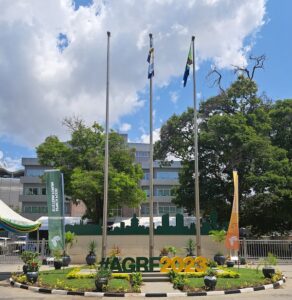
Among the various discussions and side events that took place during this forum, the “Thriving Africa with Aquatic Foods“ event organized by the World Fish Center stood out as a pivotal moment. The event brought together voices from Zambia to Uganda, shining a spotlight on the vital role and untapped potential of aquatic food systems in the pursuit of nutritious food production. Moreover, it sought to address the bottlenecks hindering progress and share real-world solutions to combat hunger, malnutrition, and poverty across the African continent.
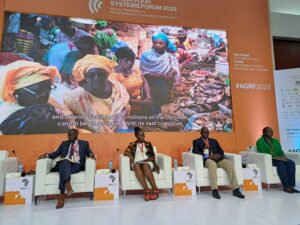
Margaret Nakato, Coordinator of Katosi Women Development Trust, passionately articulated the systematic barriers that have marginalized small-scale aquatic food producers for far too long. She emphasized their exclusion from decision-making processes, inadequate recognition, minimal investment in aquatic food production, low public funding, and the failure to implement internationally agreed instruments designed to uplift millions of small-scale aquatic food producers from the grip of poverty.
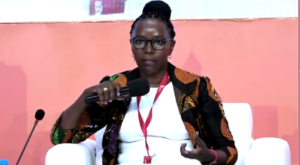
Central to the discourse was the recognition that empowering women and female youth within the aquatic food system is not only a matter of fairness but also a strategic imperative. By providing them with equal opportunities, access to resources, and decision-making roles within this sector, we tap into a vast reservoir of untapped talent and potential. It is heartening to note that many women are already deeply engaged in small-scale fisheries, particularly in the districts where the Katosi Women Development Trust intervenes. These women are the backbone of their communities, contributing significantly to food security and nutrition. However, there exists a tremendous opportunity to amplify their impact.
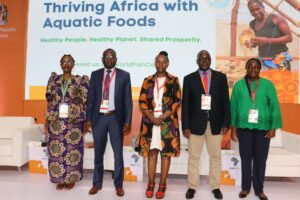
Empowering women with training and resources, such as boats and engines, can significantly enhance their participation in fisheries, thereby bolstering the sustainability and security of the aquatic food system. This, in turn, can lead to a substantial reduction in poverty levels and an overall improvement in the livelihoods of communities. The positive ripple effects of investing in women in the aquatic food system extend beyond mere economic gains. By empowering women, we foster resilience, promote sustainable resource management, and contribute to the broader goal of food security. When women are at the forefront of decision-making and resource allocation, the benefits are felt not only at the family level but also at the community and national levels.

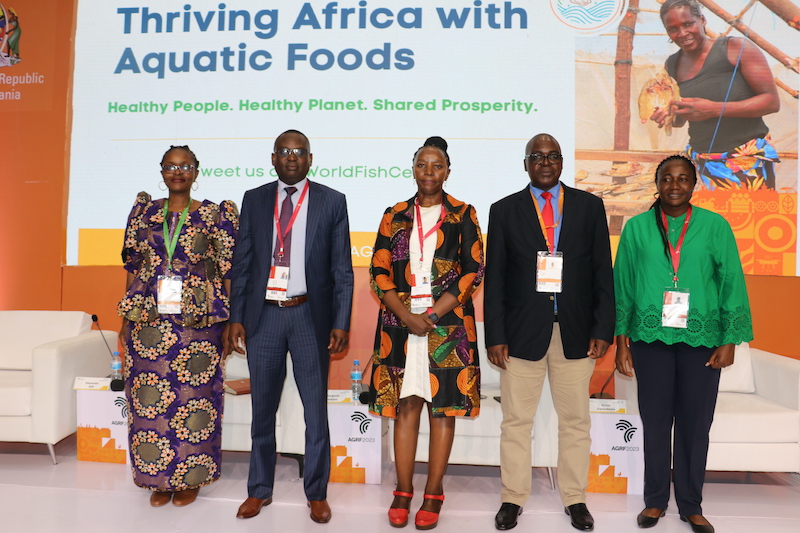
19 Comments
👏🏾 Nice article!
Hey Guys,
Warning: From February 2024, all existing email autoresponders will become obsolete!
In fact, if you want to send marketing emails, promotional emails, or any other sort of emails starting in February 2024, you’ll need to comply with Gmail’s and Yahoo’s draconic new directives.
They require regular marketers like you and I to setup complex code on sending domains… and existing autoresponders like Aweber and GetResponse are not helping: they’re requesting you do all the work, and their training is filled with complex instructions and flowcharts…
How would you like to send unlimited emails at the push of a button all with done-for-you DMARC, DKIM, SPF, custom IPs and dedicated SMTP sending servers?
What I mean by all of that tech talk above, is that with ProfitMarc, we give you pre-set, pre-configured, DONE-FOR-YOU email sending addresses you can just load up and mail straight away.
We don’t even have any “setup tutorials” like other autoresponders either, because guess what: we already did all the setup for you!
All of our built-in sending addresses and servers are already pre-warmed with Gmail and Yahoo and they’re loving us: 99% inbox rate is the average!
⇒ Grab your copy here! ⇒ https://ext-opp.com/ProfitMarc
Hey Guys,
Warning: From February 2024, all existing email autoresponders will become obsolete!
In fact, if you want to send marketing emails, promotional emails, or any other sort of emails starting in February 2024, you’ll need to comply with Gmail’s and Yahoo’s draconic new directives.
They require regular marketers like you and I to setup complex code on sending domains… and existing autoresponders like Aweber and GetResponse are not helping: they’re requesting you do all the work, and their training is filled with complex instructions and flowcharts…
How would you like to send unlimited emails at the push of a button all with done-for-you DMARC, DKIM, SPF, custom IPs and dedicated SMTP sending servers?
What I mean by all of that tech talk above, is that with ProfitMarc, we give you pre-set, pre-configured, DONE-FOR-YOU email sending addresses you can just load up and mail straight away.
We don’t even have any “setup tutorials” like other autoresponders either, because guess what: we already did all the setup for you!
All of our built-in sending addresses and servers are already pre-warmed with Gmail and Yahoo and they’re loving us: 99% inbox rate is the average!
⇒ Grab your copy here! ⇒ https://ext-opp.com/ProfitMarc
Hey Guys,
Warning: From February 2024, all existing email autoresponders will become obsolete!
In fact, if you want to send marketing emails, promotional emails, or any other sort of emails starting in February 2024, you’ll need to comply with Gmail’s and Yahoo’s draconic new directives.
They require regular marketers like you and I to setup complex code on sending domains… and existing autoresponders like Aweber and GetResponse are not helping: they’re requesting you do all the work, and their training is filled with complex instructions and flowcharts…
How would you like to send unlimited emails at the push of a button all with done-for-you DMARC, DKIM, SPF, custom IPs and dedicated SMTP sending servers?
What I mean by all of that tech talk above, is that with ProfitMarc, we give you pre-set, pre-configured, DONE-FOR-YOU email sending addresses you can just load up and mail straight away.
We don’t even have any “setup tutorials” like other autoresponders either, because guess what: we already did all the setup for you!
All of our built-in sending addresses and servers are already pre-warmed with Gmail and Yahoo and they’re loving us: 99% inbox rate is the average!
⇒ Grab your copy here! ⇒ https://ext-opp.com/ProfitMarc
Hey Guys,
Warning: From February 2024, all existing email autoresponders will become obsolete!
In fact, if you want to send marketing emails, promotional emails, or any other sort of emails starting in February 2024, you’ll need to comply with Gmail’s and Yahoo’s draconic new directives.
They require regular marketers like you and I to setup complex code on sending domains… and existing autoresponders like Aweber and GetResponse are not helping: they’re requesting you do all the work, and their training is filled with complex instructions and flowcharts…
How would you like to send unlimited emails at the push of a button all with done-for-you DMARC, DKIM, SPF, custom IPs and dedicated SMTP sending servers?
What I mean by all of that tech talk above, is that with ProfitMarc, we give you pre-set, pre-configured, DONE-FOR-YOU email sending addresses you can just load up and mail straight away.
We don’t even have any “setup tutorials” like other autoresponders either, because guess what: we already did all the setup for you!
All of our built-in sending addresses and servers are already pre-warmed with Gmail and Yahoo and they’re loving us: 99% inbox rate is the average!
⇒ Grab your copy here! ⇒ https://ext-opp.com/ProfitMarc
Hey Guys,
Warning: From February 2024, all existing email autoresponders will become obsolete!
In fact, if you want to send marketing emails, promotional emails, or any other sort of emails starting in February 2024, you’ll need to comply with Gmail’s and Yahoo’s draconic new directives.
They require regular marketers like you and I to setup complex code on sending domains… and existing autoresponders like Aweber and GetResponse are not helping: they’re requesting you do all the work, and their training is filled with complex instructions and flowcharts…
How would you like to send unlimited emails at the push of a button all with done-for-you DMARC, DKIM, SPF, custom IPs and dedicated SMTP sending servers?
What I mean by all of that tech talk above, is that with ProfitMarc, we give you pre-set, pre-configured, DONE-FOR-YOU email sending addresses you can just load up and mail straight away.
We don’t even have any “setup tutorials” like other autoresponders either, because guess what: we already did all the setup for you!
All of our built-in sending addresses and servers are already pre-warmed with Gmail and Yahoo and they’re loving us: 99% inbox rate is the average!
⇒ Grab your copy here! ⇒ https://ext-opp.com/ProfitMarc
Hey Guys,
Warning: From February 2024, all existing email autoresponders will become obsolete!
In fact, if you want to send marketing emails, promotional emails, or any other sort of emails starting in February 2024, you’ll need to comply with Gmail’s and Yahoo’s draconic new directives.
They require regular marketers like you and I to setup complex code on sending domains… and existing autoresponders like Aweber and GetResponse are not helping: they’re requesting you do all the work, and their training is filled with complex instructions and flowcharts…
How would you like to send unlimited emails at the push of a button all with done-for-you DMARC, DKIM, SPF, custom IPs and dedicated SMTP sending servers?
What I mean by all of that tech talk above, is that with ProfitMarc, we give you pre-set, pre-configured, DONE-FOR-YOU email sending addresses you can just load up and mail straight away.
We don’t even have any “setup tutorials” like other autoresponders either, because guess what: we already did all the setup for you!
All of our built-in sending addresses and servers are already pre-warmed with Gmail and Yahoo and they’re loving us: 99% inbox rate is the average!
⇒ Grab your copy here! ⇒ https://ext-opp.com/ProfitMarc
Hey Guys,
Warning: From February 2024, all existing email autoresponders will become obsolete!
In fact, if you want to send marketing emails, promotional emails, or any other sort of emails starting in February 2024, you’ll need to comply with Gmail’s and Yahoo’s draconic new directives.
They require regular marketers like you and I to setup complex code on sending domains… and existing autoresponders like Aweber and GetResponse are not helping: they’re requesting you do all the work, and their training is filled with complex instructions and flowcharts…
How would you like to send unlimited emails at the push of a button all with done-for-you DMARC, DKIM, SPF, custom IPs and dedicated SMTP sending servers?
What I mean by all of that tech talk above, is that with ProfitMarc, we give you pre-set, pre-configured, DONE-FOR-YOU email sending addresses you can just load up and mail straight away.
We don’t even have any “setup tutorials” like other autoresponders either, because guess what: we already did all the setup for you!
All of our built-in sending addresses and servers are already pre-warmed with Gmail and Yahoo and they’re loving us: 99% inbox rate is the average!
⇒ Grab your copy here! ⇒ https://ext-opp.com/ProfitMarc
Hey Guys,
Warning: From February 2024, all existing email autoresponders will become obsolete!
In fact, if you want to send marketing emails, promotional emails, or any other sort of emails starting in February 2024, you’ll need to comply with Gmail’s and Yahoo’s draconic new directives.
They require regular marketers like you and I to setup complex code on sending domains… and existing autoresponders like Aweber and GetResponse are not helping: they’re requesting you do all the work, and their training is filled with complex instructions and flowcharts…
How would you like to send unlimited emails at the push of a button all with done-for-you DMARC, DKIM, SPF, custom IPs and dedicated SMTP sending servers?
What I mean by all of that tech talk above, is that with ProfitMarc, we give you pre-set, pre-configured, DONE-FOR-YOU email sending addresses you can just load up and mail straight away.
We don’t even have any “setup tutorials” like other autoresponders either, because guess what: we already did all the setup for you!
All of our built-in sending addresses and servers are already pre-warmed with Gmail and Yahoo and they’re loving us: 99% inbox rate is the average!
⇒ Grab your copy here! ⇒ https://ext-opp.com/ProfitMarc
Hey Guys,
Warning: From February 2024, all existing email autoresponders will become obsolete!
In fact, if you want to send marketing emails, promotional emails, or any other sort of emails starting in February 2024, you’ll need to comply with Gmail’s and Yahoo’s draconic new directives.
They require regular marketers like you and I to setup complex code on sending domains… and existing autoresponders like Aweber and GetResponse are not helping: they’re requesting you do all the work, and their training is filled with complex instructions and flowcharts…
How would you like to send unlimited emails at the push of a button all with done-for-you DMARC, DKIM, SPF, custom IPs and dedicated SMTP sending servers?
What I mean by all of that tech talk above, is that with ProfitMarc, we give you pre-set, pre-configured, DONE-FOR-YOU email sending addresses you can just load up and mail straight away.
We don’t even have any “setup tutorials” like other autoresponders either, because guess what: we already did all the setup for you!
All of our built-in sending addresses and servers are already pre-warmed with Gmail and Yahoo and they’re loving us: 99% inbox rate is the average!
⇒ Grab your copy here! ⇒ https://ext-opp.com/ProfitMarc
Hey Guys,
Warning: From February 2024, all existing email autoresponders will become obsolete!
In fact, if you want to send marketing emails, promotional emails, or any other sort of emails starting in February 2024, you’ll need to comply with Gmail’s and Yahoo’s draconic new directives.
They require regular marketers like you and I to setup complex code on sending domains… and existing autoresponders like Aweber and GetResponse are not helping: they’re requesting you do all the work, and their training is filled with complex instructions and flowcharts…
How would you like to send unlimited emails at the push of a button all with done-for-you DMARC, DKIM, SPF, custom IPs and dedicated SMTP sending servers?
What I mean by all of that tech talk above, is that with ProfitMarc, we give you pre-set, pre-configured, DONE-FOR-YOU email sending addresses you can just load up and mail straight away.
We don’t even have any “setup tutorials” like other autoresponders either, because guess what: we already did all the setup for you!
All of our built-in sending addresses and servers are already pre-warmed with Gmail and Yahoo and they’re loving us: 99% inbox rate is the average!
⇒ Grab your copy here! ⇒ https://ext-opp.com/ProfitMarc
Hey Guys,
Warning: From February 2024, all existing email autoresponders will become obsolete!
In fact, if you want to send marketing emails, promotional emails, or any other sort of emails starting in February 2024, you’ll need to comply with Gmail’s and Yahoo’s draconic new directives.
They require regular marketers like you and I to setup complex code on sending domains… and existing autoresponders like Aweber and GetResponse are not helping: they’re requesting you do all the work, and their training is filled with complex instructions and flowcharts…
How would you like to send unlimited emails at the push of a button all with done-for-you DMARC, DKIM, SPF, custom IPs and dedicated SMTP sending servers?
What I mean by all of that tech talk above, is that with ProfitMarc, we give you pre-set, pre-configured, DONE-FOR-YOU email sending addresses you can just load up and mail straight away.
We don’t even have any “setup tutorials” like other autoresponders either, because guess what: we already did all the setup for you!
All of our built-in sending addresses and servers are already pre-warmed with Gmail and Yahoo and they’re loving us: 99% inbox rate is the average!
⇒ Grab your copy here! ⇒ https://ext-opp.com/ProfitMarc
Hey Guys,
Warning: From February 2024, all existing email autoresponders will become obsolete!
In fact, if you want to send marketing emails, promotional emails, or any other sort of emails starting in February 2024, you’ll need to comply with Gmail’s and Yahoo’s draconic new directives.
They require regular marketers like you and I to setup complex code on sending domains… and existing autoresponders like Aweber and GetResponse are not helping: they’re requesting you do all the work, and their training is filled with complex instructions and flowcharts…
How would you like to send unlimited emails at the push of a button all with done-for-you DMARC, DKIM, SPF, custom IPs and dedicated SMTP sending servers?
What I mean by all of that tech talk above, is that with ProfitMarc, we give you pre-set, pre-configured, DONE-FOR-YOU email sending addresses you can just load up and mail straight away.
We don’t even have any “setup tutorials” like other autoresponders either, because guess what: we already did all the setup for you!
All of our built-in sending addresses and servers are already pre-warmed with Gmail and Yahoo and they’re loving us: 99% inbox rate is the average!
⇒ Grab your copy here! ⇒ https://ext-opp.com/ProfitMarc
Hey Guys,
Warning: From February 2024, all existing email autoresponders will become obsolete!
In fact, if you want to send marketing emails, promotional emails, or any other sort of emails starting in February 2024, you’ll need to comply with Gmail’s and Yahoo’s draconic new directives.
They require regular marketers like you and I to setup complex code on sending domains… and existing autoresponders like Aweber and GetResponse are not helping: they’re requesting you do all the work, and their training is filled with complex instructions and flowcharts…
How would you like to send unlimited emails at the push of a button all with done-for-you DMARC, DKIM, SPF, custom IPs and dedicated SMTP sending servers?
What I mean by all of that tech talk above, is that with ProfitMarc, we give you pre-set, pre-configured, DONE-FOR-YOU email sending addresses you can just load up and mail straight away.
We don’t even have any “setup tutorials” like other autoresponders either, because guess what: we already did all the setup for you!
All of our built-in sending addresses and servers are already pre-warmed with Gmail and Yahoo and they’re loving us: 99% inbox rate is the average!
⇒ Grab your copy here! ⇒ https://ext-opp.com/ProfitMarc
Hey Guys,
Warning: From February 2024, all existing email autoresponders will become obsolete!
In fact, if you want to send marketing emails, promotional emails, or any other sort of emails starting in February 2024, you’ll need to comply with Gmail’s and Yahoo’s draconic new directives.
They require regular marketers like you and I to setup complex code on sending domains… and existing autoresponders like Aweber and GetResponse are not helping: they’re requesting you do all the work, and their training is filled with complex instructions and flowcharts…
How would you like to send unlimited emails at the push of a button all with done-for-you DMARC, DKIM, SPF, custom IPs and dedicated SMTP sending servers?
What I mean by all of that tech talk above, is that with ProfitMarc, we give you pre-set, pre-configured, DONE-FOR-YOU email sending addresses you can just load up and mail straight away.
We don’t even have any “setup tutorials” like other autoresponders either, because guess what: we already did all the setup for you!
All of our built-in sending addresses and servers are already pre-warmed with Gmail and Yahoo and they’re loving us: 99% inbox rate is the average!
⇒ Grab your copy here! ⇒ https://ext-opp.com/ProfitMarc
Hey Guys,
Warning: From February 2024, all existing email autoresponders will become obsolete!
In fact, if you want to send marketing emails, promotional emails, or any other sort of emails starting in February 2024, you’ll need to comply with Gmail’s and Yahoo’s draconic new directives.
They require regular marketers like you and I to setup complex code on sending domains… and existing autoresponders like Aweber and GetResponse are not helping: they’re requesting you do all the work, and their training is filled with complex instructions and flowcharts…
How would you like to send unlimited emails at the push of a button all with done-for-you DMARC, DKIM, SPF, custom IPs and dedicated SMTP sending servers?
What I mean by all of that tech talk above, is that with ProfitMarc, we give you pre-set, pre-configured, DONE-FOR-YOU email sending addresses you can just load up and mail straight away.
We don’t even have any “setup tutorials” like other autoresponders either, because guess what: we already did all the setup for you!
All of our built-in sending addresses and servers are already pre-warmed with Gmail and Yahoo and they’re loving us: 99% inbox rate is the average!
⇒ Grab your copy here! ⇒ https://ext-opp.com/ProfitMarc
Hey Guys,
Warning: From February 2024, all existing email autoresponders will become obsolete!
In fact, if you want to send marketing emails, promotional emails, or any other sort of emails starting in February 2024, you’ll need to comply with Gmail’s and Yahoo’s draconic new directives.
They require regular marketers like you and I to setup complex code on sending domains… and existing autoresponders like Aweber and GetResponse are not helping: they’re requesting you do all the work, and their training is filled with complex instructions and flowcharts…
How would you like to send unlimited emails at the push of a button all with done-for-you DMARC, DKIM, SPF, custom IPs and dedicated SMTP sending servers?
What I mean by all of that tech talk above, is that with ProfitMarc, we give you pre-set, pre-configured, DONE-FOR-YOU email sending addresses you can just load up and mail straight away.
We don’t even have any “setup tutorials” like other autoresponders either, because guess what: we already did all the setup for you!
All of our built-in sending addresses and servers are already pre-warmed with Gmail and Yahoo and they’re loving us: 99% inbox rate is the average!
⇒ Grab your copy here! ⇒ https://ext-opp.com/ProfitMarc
Hey Guys,
Warning: From February 2024, all existing email autoresponders will become obsolete!
In fact, if you want to send marketing emails, promotional emails, or any other sort of emails starting in February 2024, you’ll need to comply with Gmail’s and Yahoo’s draconic new directives.
They require regular marketers like you and I to setup complex code on sending domains… and existing autoresponders like Aweber and GetResponse are not helping: they’re requesting you do all the work, and their training is filled with complex instructions and flowcharts…
How would you like to send unlimited emails at the push of a button all with done-for-you DMARC, DKIM, SPF, custom IPs and dedicated SMTP sending servers?
What I mean by all of that tech talk above, is that with ProfitMarc, we give you pre-set, pre-configured, DONE-FOR-YOU email sending addresses you can just load up and mail straight away.
We don’t even have any “setup tutorials” like other autoresponders either, because guess what: we already did all the setup for you!
All of our built-in sending addresses and servers are already pre-warmed with Gmail and Yahoo and they’re loving us: 99% inbox rate is the average!
⇒ Grab your copy here! ⇒ https://ext-opp.com/ProfitMarc
Hey,
The moment we’ve all been waiting for is finally here – GoBuildr is now LIVE! 🎉
🌐 Create ultra-lightning-fast websites, sales funnels, eCommerce stores, and more in less than 60 seconds, with just a keyword!
🚀 Say goodbye to the limitations of traditional page builders. GoBuildr combines the functionality of 16 different tools into one powerful app, supercharged with AI-assisted technology.
⇒ Click Here To Checkout Demo https://ext-opp.com/GoBuildr